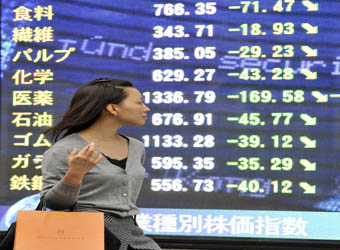Asian stock markets finished mixed Friday as gaming shares tumbled in Hong Kong and South Korea’s main index ended down before the country’s parliament voted to impeach President Park Geun-hye over an influence-peddling scandal.
The vote to impeach Park, Reuters reported, was announced in the late afternoon in Seoul.
Before the vote, the benchmark Kospi closed down 6.38 points, or 0.31 percent, at 2,024.69 at 2:30 p.m. HK/SIN. The Korean won strengthened from an earlier session low of 1,168.31 against the dollar before the news to around 1,164.26 after.
“A quick resolution and introduction of new leadership offers South Korea the best opportunity to move on from this political crisis and renew focus on the key issue facing the country — the urgent need to revamp the now stagnating chaebol-dominated economic model,” said Liam Martin of FTI Consulting in a Wednesday note.
Martin noted an impeachment vote could take up to 180 days of review by the Constitutional Court before new elections were called, which suggested continued uncertainty for South Korean politics in the near future.
Japan’s Nikkei 225 finished up 230.90 points, or 1.23 percent, at 18,996.37, notching four consecutive sessions of gains. The Topix index added 12.67 points, or 0.84 percent, to 1,525.36. Australia’s ASX 200 advanced 16.98 points, or 0.31 percent, to 5,560.62, supported by a 1.09 percent gain in the energy sector and a 0.98 percent uptick in the heavily-weighted financial sector.
Chinese mainland shares finished mixed, with the Shanghai composite closing up 16.69 points, or 0.52 percent, at 3,232.06 and the Shenzhen composite finished down 7.36 points, or 0.35 percent, at 2,070.
In Hong Kong, the Hang Seng index fell 0.56 percent, as gaming shares saw sharp losses following reports of Beijing taking aim at the Macau gaming industry in a bid to halt capital outflows.
The South China Morning Post reported Macau was planning to enforce a withdrawal limit for China UnionPay ATM card holders from 10,000 to 5,000 Macanese patacas ($626), which was expected to take effect from Saturday. This, the Post reported, followed the discovery that as much as 10 billion patacas in China UnionPay ATM withdrawals were made in one month alone.
The Monetary Authority of Macau told CNBC it would issue a statement later on Friday to clarify matters. Separately, China UnionPay, said in a statement, initially cited by Reuters, that it had not changed its policy on overseas withdrawal limits for mainland-issued cards, which were set at 10,000 yuan ($1,449) a day.
Shares of Wynn Macau tumbled 7.52 percent, Sands China was lower by 8.13 percent, Galaxy Entertainment fell 7.30 percent, SJM Holdings was down 6.65 percent and Melco International Development sank 9.74 percent.
Australia’s Crown Resorts fell 5.32 percent.
The CEO of MGM International, Jim Murren, told CNBC’s “Mad Money” the control the Chinese government placed were “consistent with the kinds of controls they have put into place in the past.”
“I know there’s a lot of chatter about this today. I don’t want to minimize the significance. It will reduce some gaming revenue. But the long term play in Macau is an extremely positive story and we’re looking forward to opening up a very, very entertainment laden new resort in Cotai next year,” he said.
The European Central Bank (ECB) surprised markets on Thursday by announcing it would extend its massive bond-buying programme from April 2017, but would reduce the size of the monthly purchases. The ECB currently purchases assets worth 80 billion euros ($86 billion) a month, in a programme that was due to end in March 2017.
While the central bank was set to extend that programme until at least December of next year, ECB chief Mario Draghi said it would purchase assets worth 60 billion euros monthly from April.
The euro fell against the dollar from levels over $1.08 before the announcement to around $1.06 on Friday afternoon Asia time.
Some analysts said the market was reading Draghi’s announcement as a “calibration” rather than “tapering.”
“In his words, tapering is reducing to zero purchases,” said David de Garis, a director of fixed income, currencies and commodities at National Australia Bank. “Perhaps the euro’s reaction was as much about Draghi’s characterization of the economic outlook.”
While the bank’s statement noted that incoming data pointed to a continuing growth trend in the fourth quarter, it noted that “economic growth in the euro area is expected to be dampened by a sluggish pace of implementation of structural reforms and remaining balance sheet adjustments in a number of sectors.”
In the broader currency market, the dollar remained relatively strong against a basket of currencies, trading at 101.14 on Friday afternoon in Asia. The yen traded at 114.39 against the greenback, while the Australian dollar was at $0.7465.
Oil prices finished above the $50 benchmark during U.S. hours on Thursday, ahead of another meeting among oil producers in Vienna on Saturday. Reuters reported OPEC Secretary General Abdalla El-Badri as saying that non-OPEC producers needed to cut about 600,000 barrels a day to complement OPEC’s agreed cut of 1.2 million barrels a day to tackle the global supply glut.
During Asian hours on Friday, U.S. crude added 0.57 percent to $51.13, after gaining 2.2 percent in the overnight session, while global benchmark Brent gained 0.2 percent to $54.00, after finishing up 1.7 percent on Thursday.
On Thursday, the Dow Jones industrial average rose 65.19 points, or 0.33 percent, to close at 19,614.81; the blue-chip index has now posted gains in 19 of the past 23 sessions and 13 record closes since the U.S. election. The S&P 500 index gained 4.84 points, or 0.22 percent, to end at 2,246.19, while the Nasdaq finished up 23.59 points, or 0.44 percent, at 5,417.36.
Source: CNBC


